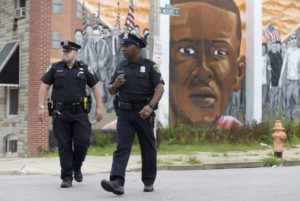
Image courtesy of the Washington Post.
Just last year, the U.S. Justice Department released a scathing report on the Baltimore Police Department after an investigation revealed that city officers had consistently discriminated against Black residents and wielded excessive force. Now, the government agency and the city of Baltimore have finally reached an agreement on a court-enforceable consent decree that would require the police department to make sweeping reforms.
Details of the 227-page consent decree, which Baltimore’s five-member spending board unanimously approved on Thursday, Jan. 12., weren’t made public until this morning. The Baltimore Sun reported, however, that the agreement must still be approved by a U.S. District Court judge before it becomes binding.
“This is only the beginning of the process,” said Mayor Catherine Pugh, who, alongside U.S. Attorney General Loretta Lynch, made the announcement at City Hall on Thursday, Jan. 12.
The Baltimore consent decree calls on the city’s police department to make a number of necessary changes to its policing strategies, including training officers to use de-escalation tactics before resorting to violence, educating them on implicit bias and training them on how to interact with and respond to victims of sexual assault. The decree also mandates the implementation of a community oversight task force, as well as an independent federal monitor to oversee the department, according to NPR.
Moreover, in response to the April 2015 death of Freddie Gray, the agreement requires that all vans used to transport individuals in custody be equipped with working video cameras that are turned on the whole time a detainee is in the vehicle. Citywide protests demanding police accountability after Gray’s death is what prompted the DOJ’s lengthy civil rights investigation into the department last year.
“The agreement is designed to increase transparency, public oversight [and] accountability,” Pugh said, adding that the changes to come would require much more training.
The Baltimore Sun reported that the city and the federal government took five months to negotiate the agreement but hoped to reach an accord before president-elect Donald Trump took office. The deal comes just one week before Trump’s inauguration and officials on both sides expressed concern that Jeff Sessions, the president-elect’s pick for attorney general, wouldn’t be on board with enforcing the consent decree.
“I think there is concern that good police officers and good departments can be sued by the Department of Justice when you just have individuals within a department that have done wrong,” Sessions said during the first round of his confirmation hearings on Tuesday, Jan. 10.
“These lawsuits undermine the respect for police officers and create an impression that the entire department is not doing their work consistent with fidelity to law and fairness, and we need to be careful before we do that,” he continued.
Though the DOJ and Baltimore have reached an agreement, there’s no guarantee that it will be approved by a judge before Inauguration Day. Consent decrees around police reforms in other cities across the U.S. have been known to sit for months before being signed off by a judge, the newspaper reported.
Moreover, the agreement could take years to implement once it’s finally approved.


